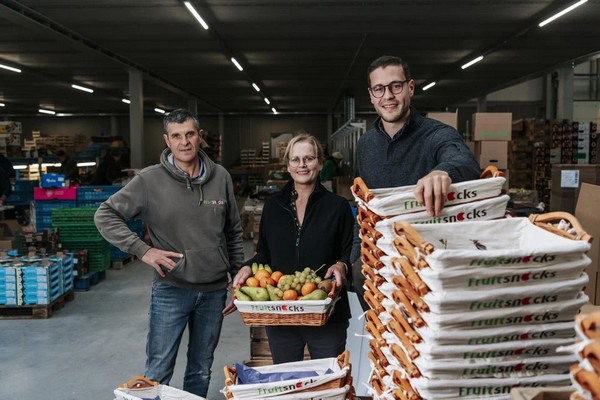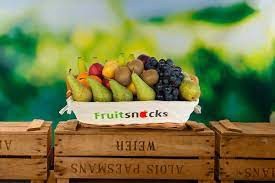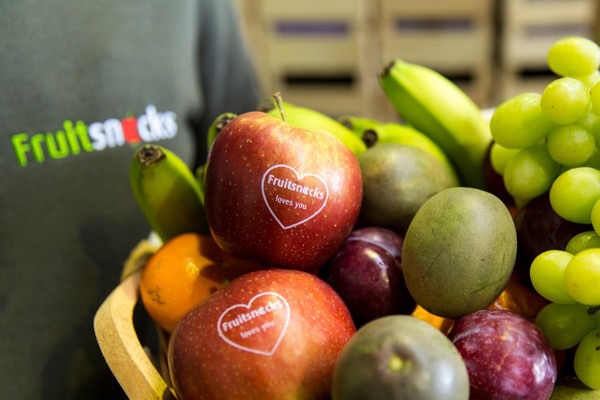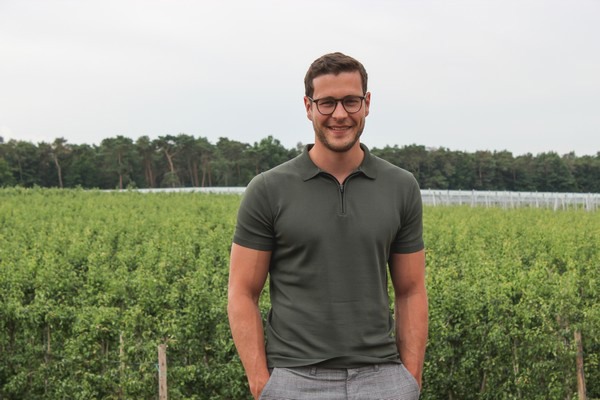Fruit at work: not the done thing during the pandemic when working from home became the norm. Yet, Belgian company Fruitsnacks, which specializes in this, weathered the crisis, even acquiring five other businesses in the three years since the pandemic began. "I think believing in our vision and optimizing sales per customer, partly through the takeovers, helped us emerge better. We're reaping the benefits of that now," Roel Paesmans of this family-owned company begins.

"It was March 2020. We'd just had the two best months ever, with many inquiries and new clients. Business was booming. Then, suddenly, a three-week lockdown was declared. We, literally, weren't allowed to deliver fruit, and sales plummeted to zero." The family took this as a sign to start thinking about how to survive a pandemic in a sector that had shut down completely.
"We had to work very hard that first year to achieve 50% sales. However, we knew if we didn't deliver to customers who still wanted the fruit, they'd look elsewhere. So we chose to keep supplying. Even if that meant driving all over with half-filled trucks. Since transportation is our biggest expense, we were doing so at a huge loss, too," says Roel.
 They debated the alternatives. "In such times, you could decide to deliver fruit to family homes. But, because of the pricey transportation, we'd have to charge too much for too few fruits."
They debated the alternatives. "In such times, you could decide to deliver fruit to family homes. But, because of the pricey transportation, we'd have to charge too much for too few fruits."
"That was something we simply weren't prepared to do. So, we kept focusing purely on our business clients and considered how to reduce costs and increase sales per customer. Some similar companies couldn't pass on the costs, becoming hesitant about keeping to supply fruit. We acquired those, leading to us making five acquisitions since 2020. That helped, too," Roel explains.
"One of those takeovers resulted in, for example, us adding an organic soup offer. And we've been supplying fruit to 200 schools since January. But we've also managed to make our transport routes more efficient. We deliver on set routes in Belgium, Luxembourg, the Netherlands, and Germany."
"Acquiring other companies' clients means we could add more of them to some routes. So, at no extra cost to us, there are more volumes on a route, and we keep our customers' costs down. The soups and this transportation optimization lets us increase our revenue per client," says Paesmans.
'The carrot or the stick'
It benefited the business when the lockdowns ended. "Demand rose again, and with our expansions, we're now well above pre-COVID volumes. The pandemic also made people more aware of health, so snacks like fruit are considered more in the workplace. Still, employees have become quite used to working from home."
"I can imagine, though, that employers want their staff back in the office. Then you can either use the stick or the carrot: force people back into the office or attract them by, say, offering good coffee or tasty fruit. That, naturally, all worked in our favor," Roel continues.
Yet, not everyone's doing equally well now that life has returned to 'normal'. "We aren't having the easiest time, either, but we saw it coming. That's why we tried to respond by, for instance, setting up a more efficient production line and installing a new ERP system. We had to do that to reduce costs. Also, as mentioned, we wanted to optimize sales per customer. We have, thus, had to pass on very few price increases to our customers, something that was also a priority."

Nonetheless, this is not entirely sustainable for the business, which also grows top fruit on some 67 hectares. "There, too, storage energy costs went through the roof, and wages rose by 11%. It has to stop somewhere, or else your business won't survive. For us, it meant we had to implement a five percent price increase. Fortunately, we got very little negative feedback because our customers understand the situation. We try to do it as little as we can, but once in a while, you must pass on those costs," says Roel.
"Fruitsnacks is growing, so the farm's becoming further entrenched"
The family cultivates much of the fruit it uses in the baskets. "We grow the apples and pears, and my father buys the other fruit at the early market every Wednesday." Still, last year brought some headaches. "It was a perfect storm. Energy and personnel costs skyrocketed, and demand fell away, largely because of Russia. But our advantage was that we could sell much of the crop directly to consumers."
"It's also our family vision: Fruitsnacks is growing, so the farm's becoming further entrenched." Currently, all their apples are processed through Fruitsnacks. "The larger A sizes go to companies, and the smaller ones suit schools perfectly. We use 25% of our pears in Fruitsnacks; we trade the rest through the 'normal' route. Eventually, of course, we want to reach 100% with that as well," Roel admits.
As mentioned, the company supplies Belgian, Dutch, Luxembourgian, and German clients. "When we started 16 years ago, we immediately became active all over Belgium. Luxembourg followed fairly quickly, with the Netherlands and Germany recently added. These are great markets for us in which to keep growing in the coming years."

Fruitsnacks delivers to more than 3,400 customers, including 200 schools. For now, besides the recently added organic soups, the baskets contain only fresh fruit. "We considered other items, like sliced products. However, the costs are always the problem. Adding nuts or sliced fruit involves significant costs. This cost is an important, noticeably limiting component for many companies. So, fresh fruit remains our staple," states Roel.
The company's range includes organics. "We can supply it to anyone who wants it. Yet, at present, it's only about 0.5% of sales, and that demand's actually declining. The supply's there, but companies aren't opting for it. It's twice as much, and the fruit doesn't look as nice, so businesses aren't taking that step."
Climate neutral by 2035
Looking ahead, this Paesmans family member is very optimistic. "I think we can start capitalizing on our lockdown vision and expand further in new markets like the Netherlands and Germany," she says. "We've also set a tough target regarding sustainability. That's always been paramount to us because, as growers, we, of course, live off the land."
"We want to be climate neutral by 2035. That's sooner than the European goal. We, however, gladly work towards zero emissions. It's ambitious, but we still have 12 years. In this, we're trying to get the entire company to play a pioneering role: from purchasing to the premises and delivery. And I'm sure we can meet that deadline," concludes Roel .
For more information: Roel Paesmans
Roel Paesmans
Fruitsnacks
34 Mierhoopweg
3850, Wijer, Belgium
Tel.: +32 (0) 116 95 280
Email: [email protected]
Website: www.fruitsnacks.be










